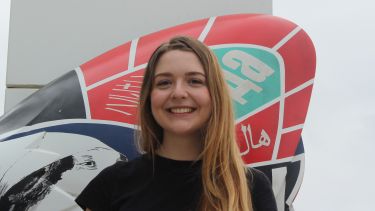Studying aerospace engineering opens up a number of opportunities and gives you the ability to choose an industry you’re passionate about.
So Hannah, can you tell us a bit about who you work for?
I work as a Renewable Graduate Engineer for Siemens Gamesa. They are a leading wind turbine manufacturer, covering the design, manufacture, installation and service of wind turbines. They are leading the world in both offshore and onshore wind turbine technology.
I joined the Siemens Gamesa graduate scheme the September after graduating. This is the first year that the graduate scheme I am on has been run, it’s partnered with the University of Hull where I study part time for a MSc in Offshore Wind Energy Engineering. It’s been great to build on the concepts I learnt at Sheffield with industry specific knowledge. I’m almost 2 years into the scheme, which runs for up to 3 years.
In your work, what are your main responsibilities?
I’m working in the construction team of the Hornsea 2 project on my current rotation. A big part of this is learning how the site works and what the processes are. Some of my main responsibilities have been looking at the process for lifting the components onto the vessel and supporting with a blade quality campaign. As a graduate engineer I get to see a real mix of tasks to understand the intricacies of how the turbine works and the technical issues we can face.
Can you describe a typical day?
I’m based at the pre-assembly site in Hull where the components are stored and prepared before they’re taken offshore to be installed. I love coming into work, there are plenty of complexities every day but that is what makes it such a rich learning experience for me. I work with several different teams including quality, health and safety, site management, project management, and construction. On some days I might be out on site on a quality walkdown, on others I might be tracking deviations at my desk, and some days might have more meetings where we’re planning for the next month’s activities.
What is the most rewarding aspect of your current role or your greatest career achievement so far?
I love working in an industry which is paving the way for new, green technology and being able to see the tangible difference that my work is doing. Hornsea 2 will have a capacity of 1.4 GW which is enough to provide power for 1.3 million homes.
Are there any challenging aspects? If so, what are they?
The wind industry is still relatively new in many ways, and although new product development is really exciting, there are constantly evolving challenges. So much planning takes place to prepare for the project but there are still problems that couldn’t have been predicted, so adapting and dealing with these efficiently can be testing.
What skills/qualifications from your degree or other training do you make use of in your job?
The principles taught in Aerospace Engineering map quite well to the wind energy industry; there are considerations about materials, aerodynamic profiles, corrosion and weather, structural integrity, manufacturing processes. There are so many different aspects and it’s been great to have a baseline understanding of these topics.
How have these skills or your course made a difference in your career?
In a wider sense than just the module content, studying Aerospace Engineering really developed my attention to detail, analytical skills and ability to work through complex problems. It was a new industry that I had no experience of, so being able to adapt and apply these skills to different situations has been really helpful in my career so far.
Looking now at your time at university, why did you choose to study at Sheffield rather than another institution?
I had been interested in Sheffield for a few years and was really impressed with the facilities and how broad the engineering department was. There was a great mix of the academics and overall feel of the city, I felt it was somewhere I’d be really happy to spend a few years.
Did your time at Sheffield meet your expectations?
Sheffield helped me to grow and develop in a number of ways, it’s a great city to live in; the university has excellent facilities and the teaching in Aerospace Engineering was great. There are almost endless opportunities to get involved in and it really is what you make of it.
And, if you could give one piece of advice to current students or recent graduates, what would it be?
Explore industries you might not have considered before; it wasn’t until the final year of my degree that I realised how perfectly the wind industry suited me. Studying aerospace engineering opens up a number of opportunities and gives you the ability to choose an industry you’re passionate about.
Looking ahead, where do you see yourself in the future?
I’ve really enjoyed my time at Siemens Gamesa so far and like that there are so many different paths to go down. There are plenty of exciting developments the wind industry needs to be able to reach the government target of 40GW installed by 2030, and I’d love to continue to play my part in this.
Hannah was featured in an article on the BBC website about the challenges faced by the UK economy, and what is being done to support it. You can read the article here.

International undergraduate scholarships
We are offering scholarships of £2,500 for each year (subject to a 60% average) of your undergraduate degree. The maximum value is £10,000 for four-year programmes.

